|
|
|
Sort Order |
|
|
|
Items / Page
|
|
|
|
|
|
|
| Srl | Item |
| 1 |
ID:
163592
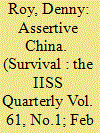

|
|
|
|
|
| Summary/Abstract |
China's irredentist claims cover an area so vast that it is already tantamount to a sphere of influence.
|
|
|
|
|
|
|
|
|
|
|
|
|
|
|
|
| 2 |
ID:
144166
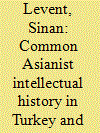

|
|
|
|
|
| Summary/Abstract |
This article proposes that Turanism played similar roles in Turkey and Japan in terms of forming a common Asianist thought, which can also be considered an anti-Western intellectual notion. Central Asia was depicted as irredenta, and Turanists in each country dreamed of independence for Turan-origin people in the region. Some of them even took action, as seen in the examples of Imaoka and Enver Pasha. Russia, as a member of the West, was othered in both countries. Togay, as a Russian Turkic-origin thinker, believed that Japan was a Turan-origin country, which had potential to dispose the Russian influence on Turkic people, which could enable their independence. Apart from Russians, Han Chinese played the villain's role due to the Mongolian, Manchurian, and East Turkestan questions. Turanism, which has been almost forgotten today, formed a common Asianist intellectual root in Turkey and Japan in the first half of the twentieth century.
|
|
|
|
|
|
|
|
|
|
|
|
|
|
|
|
| 3 |
ID:
079903


|
|
|
|
|
| Publication |
2007.
|
| Summary/Abstract |
Irredentism developed into an anomaly in post-World War II Europe and - contradicting the dire predictions of the 1990s - has remained an anomaly even since the end of the Cold War. Focusing on the renunciation of the FRG's and the Republic of Ireland's irredentist claims, I propose a novel route to analyse dispute settlement. I contend that nations justify their stance in a conflict. In the case of irredentism, they do not merely assert that a disputed territory is their land but justify to themselves and others why the disputed territory is rightfully theirs and why pursuing the irredentist stance is worthwhile. The disruption of this justification - what I call dejustification - constitutes a pathway to dispute settlement. Dejustification occurs through a change of the ideational environment that serves as the resource for justifying the claim and an advocacy that constructs a mismatch between environment and claim
|
|
|
|
|
|
|
|
|
|
|
|
|
|
|
|
| 4 |
ID:
122815
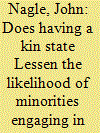

|
|
|
|
|
| Publication |
2013.
|
| Summary/Abstract |
Existing research has demonstrated that the ability of secessionist movements to mobilize is highly contingent on assistance from external actors, especially via transborder ethnic ties. The specific relationship between kin state and kin group is seen as particularly enhancing to opportunities for secessionism/irredentism. Yet, the analysis of data (1989-2011) does not support this claim. Relatively few groups with kin states have engaged in violent secessionism, and these examples are mostly restricted to successor states from Yugoslavia and the Soviet Union. Thus, this article argues that there are a number of reasons why the relationship between kin state and group increasingly engenders moderation. These reasons are the following: the failure of irredentism as a policy and idea; the asymmetric and problematic relations between kin state and group; and the protective capacity and the provision of resources by the kin state. As such, while external help is vital for secessionist groups to successfully mobilize, kin states typically provide assistance that fosters restraint and peace among their kin.
|
|
|
|
|
|
|
|
|
|
|
|
|
|
|
|
| 5 |
ID:
153147
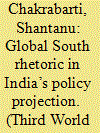

|
|
|
|
|
| Summary/Abstract |
While an on-going statist project tries to portray India as a ‘rising power’ in world politics, the fact remains that India’s global projection continues to be heavily fashioned by the Global South rhetoric. Such rhetoric is inclusive of irredentism and contestation with western norms and ideals along with cooperation leading to a complex process of interactions shaping up the global order. For countries like India being claimant to the status of ‘civilisational state’, the strong urge for autonomy along with the self-perception of national and cultural greatness is shared by the elite along with a sense of strategic importance. Such identity formation, however, reduces and sometimes obliterates the gaps between ‘internal’ and ‘external’, bringing into academic scrutiny the whole range of policymaking and to what extent it matches the state rhetoric.
|
|
|
|
|
|
|
|
|
|
|
|
|
|
|
|
| 6 |
ID:
177700
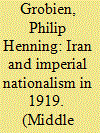

|
|
|
|
|
| Summary/Abstract |
Interposed between the Constitutional Revolution and the rise of Reza Khan, Iran began a foreign diplomacy that asserted a nuanced nationalism. After the devastation of the First World War, Iran sent a commission to the Peace of Paris. There, Iran put forward a nationalist programme which sought a sovereign and independent Iran, and the return of territory lost since 1828. Whilst many facets in this nationalist programme had been articulated before 1919, it is the consolidation within one programme which makes this programme unusual. It was also the first time such a great number of specific territorial claims were made. This imperial nationalism, requires an assessment within the narrative of Iranian nationalism, and will be explored in this article.
|
|
|
|
|
|
|
|
|
|
|
|
|
|
|
|
| 7 |
ID:
106846
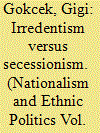

|
|
|
|
|
| Publication |
2011.
|
| Summary/Abstract |
Conventional wisdom suggests that irredentist causes, advanced by sovereign states whose politically dominant ethnic groups have access to large-scale armies, are more likely to lead to international conflict than secessionist ones, which are fought by underprivileged minorities lacking adequate military resources. This article challenges this general assumption in the literature by arguing that irredentist causes initiated by underprivileged minorities are unlikely to lead to war; likewise, secessionist causes supported by resource rich states are just as likely to escalate to international conflict. This argument is supported with evidence from the Basque and Kurdish conflicts.
|
|
|
|
|
|
|
|
|
|
|
|
|
|
|
|
| 8 |
ID:
120005
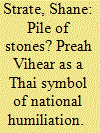

|
|
|
|
|
| Publication |
2013.
|
| Summary/Abstract |
The most recent border tensions between Thailand and Cambodia represent only the latest round of conflict over the status of Preah Vihear (Thai: Phra Viharn). This article uses newspaper and archival material to explore the modern history of the temple, largely from the Thai perspective, and focuses on how Preah Vihear has become the centrepiece of a Thai discourse on National Humiliation. Beginning with Prime Minister Phibun Songkhram's irredentist campaign of 1940, the Thai have associated these ancient ruins with the legacy of Western imperialism, particularly the territory 'lost' to French Indochina. For Thai nationalists, the 1962 international court case that awarded sovereignty over the temple site to Cambodia is an example of neo-imperialism that is part of this legacy. Thai media coverage of the court case compared the Preah Vihear situation with past defeats, including the loss of the four provinces in 1946 and the Franco-Siamese crisis of 1893. Conversely, Sihanouk and Cambodian leaders constructed a counter-narrative that compared Thai claims to Preah Vihear with the long history of Siamese imperialism in the region. It is Preah Vihear's centrality in National Humiliation discourse, rather than its religious or architectural significance, which makes it a powerful icon.
|
|
|
|
|
|
|
|
|
|
|
|
|
|
|
|
| 9 |
ID:
144776
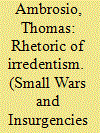

|
|
|
|
|
| Summary/Abstract |
Following the February 2014 fall of Viktor Yanukovych as president of Ukraine and the installation of a pro-Western government in Kiev, Russia initiated an irredentist intervention to annex the Crimean peninsula. Although much attention has focused on the use of military forces without country or unit insignia (the ‘little green men’ of irregular warfare), a crucial part of this operation involved a complex and multilayered perception management campaign to advance a self-interested narrative, which defined the contours of debate, justified their actions at home and abroad, and provided those actions with legal and normative legitimacy. This article examines the Kremlin’s rhetoric in three areas: Crimea’s secession from Ukraine was a legal act of self-determination; Russia possesses justifiable historical, cultural, and legal claims to Crimea; and, Western criticism of Russia’s actions are dishonest and a reflection of their anti-Russian, Cold War mentality.
|
|
|
|
|
|
|
|
|
|
|
|
|
|
|
|
| 10 |
ID:
183463


|
|
|
|
|
| Summary/Abstract |
Political violence has uninterruptedly afflicted Somalia since its independence. That amounts to 60 years of uninterrupted conflict, quite a record in contemporary history. For that reason, Somalia has been considered as one of the epitomes of what is known as an intractable conflict and Intractable Conflict Theory (ICT) has used the country as a laboratory to test its frameworks. However, we contend that systemic and very overarching frameworks such as ICT are not very useful to understand the intractability of Somalia’s conflict. This paper proposes instead a historically grounded structural-processual analysis that explains the conflict as the result of the chronological accumulation and dysfunctional overlapping of several sets of structures an actors within Somalia’s society itself and the Horn of Africa leading to the creation of very deep fault lines that create a criss-crossed fabric of conflicting interests, separating and pitting social actors against each other.
|
|
|
|
|
|
|
|
|
|
|
|
|
|
|
|
|
|
|
|
|